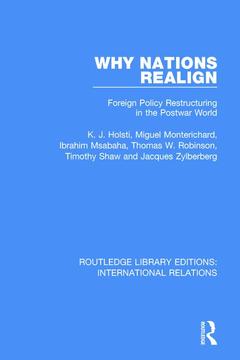Why Nations Realign Foreign Policy Restructuring in the Postwar World Routledge Library Editions: International Relations Series
Auteur : Holsti Kal

This book, originally published in 1982, analyzes the process of radical foreign policy change ? how states restructure their foreign relations, and why they do so. Using a common analystical framework, the authors examine Bhutan, Burma, Canada, Child, China and Tanzania. They distinguish between piecemeal foreign policy change and adaptation, and the fundamental re-ordering of foreign policy. Their analysis underlines the extent to which non-military and sometimes imagined threats, such as dependency and external economic and cultural penetration, can constitute an important cause of radical realignment activity.
Introduction. 1. Restructuring Foreign Policy: A Neglected Phenomenon in Foreign Policy Theory K. J. Holsti 2. From Isolation to Dependence: Bhutan, 1958-62 K. J. Holsti 3. From Dependence to Diversification: Tanzania, 1967-77 Timothy M. Shaw and Ibrahim S. R. Msabaha 4. From Dependence to Diversification: Canada 1972-8 5. From Diversification to Isolation: Burma, 1963-7 K. J. Holsti 6. Restructuring Chinese Foreign Policy, 1959-76: Three Episodes Thomas W. Robinson 7. An Abortive Attempt to Change Foreign Policy: Chile, 1970-3 Jacques Zylberberg and Miguel Monterichard 8. Restructuring Foreign Policy: A Comparative Analysis K. J. Holsti
Date de parution : 10-2015
15.6x23.4 cm
Date de parution : 08-2017
15.6x23.4 cm
Thème de Why Nations Realign :
Mots-clés :
foreign; policy; restructuring; reorientation; druk; gyalpo; jigme; dorji; eastern; economic; Foreign Policy Restructuring; West Germany; Pearson Government; Foreign Policy Reorientation; Canadian American Relationship; Jigme Dorji; Ne Win; CIA Operation; Chile's Foreign Policy; Dew Line; Tanzania's Attempts; United States; External Diversification; Non-military Threats; Druk Gyalpo; Chinese Foreign Policy; Arusha Declaration; Popular Unity; Canadian American Relations; Ivory Coast; Southern Pacific Region; Nehru's Visit; Burmese Officials; NATO Strategy; Chinese Communist Party



